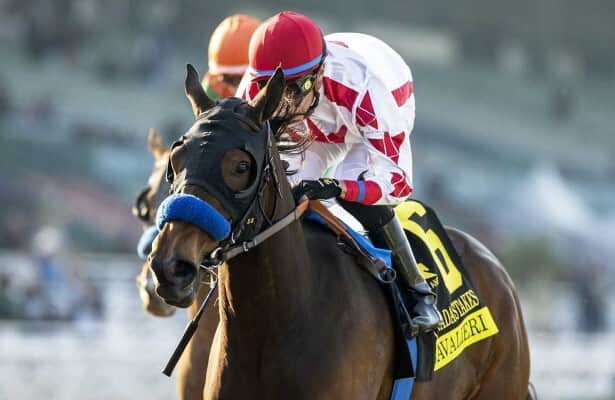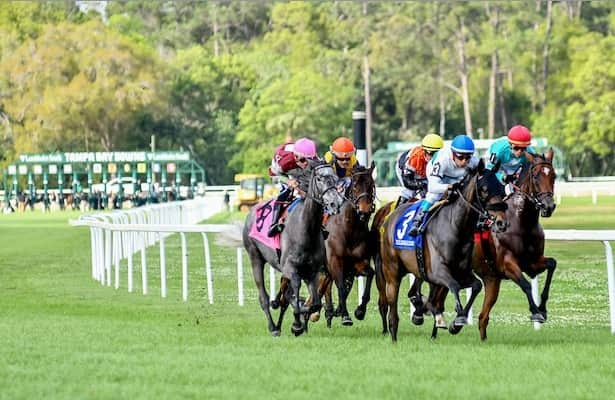Racing tradition continues at Tillamook County Fairgrounds – KMUN
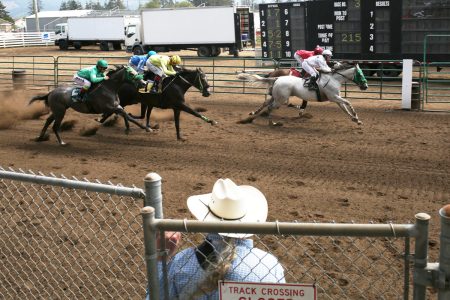

TILLAMOOK — The rodeo queen and her court have made some calculations.
In their hands are 2-pound blocks of medium cheddar cheese, Tillamook County Creamery Association brand.
Between horse races at the Tillamook County Fair in August, they carry the cheese from their seats in the arena to the paddock where jockeys and horses gather before each race. They place a block of cheese above each stall.
By the end of this year’s four-day meet, they estimate they will have carried and placed roughly 300 pounds of cheese.
It’s a tradition. Why? They’re not sure, though it makes sense to them that a place known for its dairy farms would give the gift of cheese.
The horse races themselves have an even longer tradition at the fair. Today, the Tillamook County Fair is one of only four venues left in Oregon where people can still go see live horse racing.
For jockeys, breeders, owners, trainers and others in the industry, the Tillamook County Fair is an important link in an ever-diminishing circuit of racing events across the region. For the fair, the races are a major draw, attracting key local sponsorship and bringing in thousands of visitors from across the state and beyond. Some of these visitors only come for the races.
Fair Manager Camy VonSeggern says that as long as she is in charge of running the fair the races will continue.
“I need it to be here,” she said. “We get a lot of buy-in from locals, local people who have either been horse breeders, horse owners. Just the interest in the sport itself draws a lot of people who are local – and their families for generations have been involved in it in one way, shape or form.”
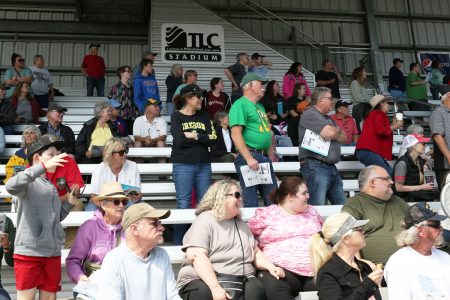

But the fair relies on the state for the money to host the races and maintain necessary infrastructure like the track. The line item in the fair’s budget this year for the races was for $260,000, all of it essentially pass-through funds. The fair receives a percentage of the total handle – the amount of money wagered by bettors – but that money, too, gets poured back into the races.
And the Oregon Racing Commission, the state agency that oversees the summer circuit of horse races across the state and the betting on the races, has faced significant scrutiny from lawmakers in recent years. Discussions about how horse racing should be managed in Oregon are expected to surface in the next legislative session.
‘It’s a very complicated industry’
Connie Winn, executive director of the Oregon Racing Commission, says there are always going to be questions and concerns.
“It’s a very complicated industry,” she said. “It’s a hard industry to get to know. We’re not Kentucky where it’s front and center all the time. I think the only thing I can do is continue to reach out to the public and answer questions and try to do the best I can to fix things. Not necessarily that they’re broken, but you can always make improvements.”
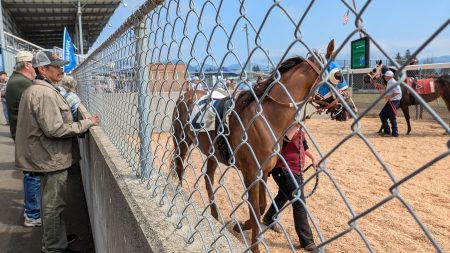

In recent years, however, there were concerns that aspects of the commission were very much in need of improvement.
Last summer, the Secretary of State’s Office released an audit of the Oregon Racing Commission that painted a picture of an agency in some disarray and an industry in decline.
Auditors investigated the agency after concerns were raised about the racing commission’s ability to regulate a proposed facility that wanted to offer over 200 historical horse race game terminals. The machines let people bet on historical races. The Department of Justice ultimately concluded that this amounted to a lottery and would violate provisions of the Oregon Constitution.
Auditors later identified several issues including lack of oversight and transparency in how the racing commission allocated money to support race meets, commercial races and horse associations in Oregon. Also, the agency did not have a full commission in place.
All of it shone a spotlight on a tiny agency that is relatively unknown to most Oregonians and unscrutinized by lawmakers even as it facilitates more than $6 billion in betting on races in Oregon, other states and even other countries.
Winn told KMUN that most of the issues listed by state auditors had already been addressed or were in the process of being remedied by the time the audit was released in August 2023. Meetings and documents are more accessible, she said. The makeup of the commission, in particular, has seen marked changes, including the addition of a commissioner with a background in animal welfare – a first for the commission.
Some of the same lawmakers who criticized the agency now say they think it is heading in the right direction. Still, questions remain about the racing commission’s role going forward.
“And those questions are largely on the governor’s desk right now in terms of what this commission is going to do, or, in fact, whether we’re going to continue to operate through this commission or perhaps shift some of their responsibilities to a different state agency,” said state Rep. David Gomberg, a Democrat who represents Oregon’s central coast.
Gomberg serves on the subcommittee that oversees the racing commission’s budget. When the Legislature convenes in February and begins working on a new budget, he hopes to see proposals from Gov. Tina Kotek’s staff. He says there is always the potential for proposed legislation that could dramatically change the role of the commission or the status of racing.
One issue still on his mind is greyhound racing.
Dog racing is illegal in Oregon, but the Oregon Racing Commission facilitates online betting on dog racing across the country and all around the world – in places where, Gomberg says, “the standards aren’t as clear, where the fairness of the races is not as clear and, certainly, the safety of the animals is not as clear.”
The proceeds help support the live horse racing industry around Oregon.
“It’s a little bit of a dilemma right now that on the one hand we’re trying to phase out this dog racing and dog racing support,” Gomberg said. “But in doing so, we undercut our ability to sustain and maintain horse racing and horse racing safety in small venues like Tillamook County.”
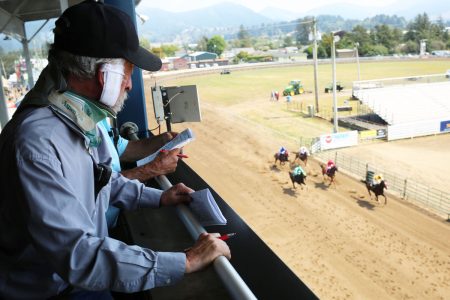

Rep. Paul Evans, a Democrat from Monmouth, was another critic of the racing commission. He says he has more confidence in the agency now, particularly with the appointment of former state Rep. Margaret Doherty, the current chair of the racing commission.
“She was the exact right choice,” Evans said.
Evans doesn’t entirely blame the racing commission for where it landed several years ago, though.
Lawmakers had passed laws that limited revenue for the commission, he said, but they didn’t understand or anticipate what might be out there ready to fill the gap – the technology emerging around gambling and betting.
The end of greyhound racing, the decline in betting on horse races and the rise of alternative forms of gambling had a profound impact. Oregon laws also offer conflicting interpretations for what kind of gambling is legal in the state, state auditors noted in their report.
“Horse racing is expensive, right?” Evans said. It is costly to ensure safety and animal welfare, to maintain the facilities where races happen. The events themselves may not generate much revenue.
“And, yeah, everybody was in a corner,” Evans said. “They were trying to figure out a way to keep the mission moving forward in creative ways. And I think they just kind of let things get a little too far.”
‘You have to really love it’
The racing commission relies primarily on wagering revenue – the cut of money it gets when people bet on live Oregon horse races or, importantly, through advanced deposit wagering hubs that allow people to place bets on races outside of the state.
While this last option has helped the industry stabilize, state auditors said it has not helped it grow.
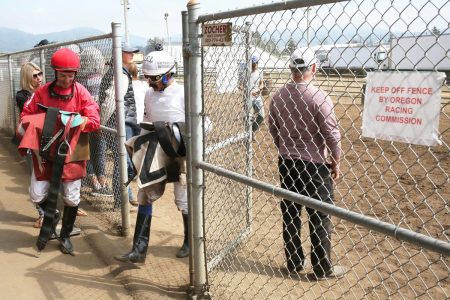

In their 2023 report, the auditors noted that most of all pari-mutuel wagering regulated by the Oregon Racing Commission occurs outside of Oregon. The gross wagering total for the wagering hubs came to over $6 billion in 2022. The money the state received was around $3 million, most of which went to the racing commission to support race meets and Oregon horse associations.
Live horse racing used to be more robust. When the Portland Meadows tracks in Portland were still open, there were 500 horse races in Oregon in 2018. Portland Meadows closed in 2019 and other meets ran fewer race days. By 2022, the number of horse races statewide had dropped to 129.
Horse breeding has also declined nationally over the last decade. Breeding feeds racing and racing feeds breeding.
When Portland Meadows was open, Nick Lowe, a trainer based out of Ridgefield, Washington, worked with 20 to 30 horses. Now, as he looks to retire, he is working with only a handful of race horses.
Another generation of trainers is coming up behind him, but there are fewer places to run horses.
“It seems to be a little smaller than it was in the past, that generation that’s interested in it, because it’s a tough way to make a living and there’s so many better opportunities for people to make a living out there,” Lowe said. “You have to really love it.”
Jockey Connie Doll jokes that it’s not a lifestyle or a job at all: “It’s an illness.”
She has been racing for more than 40 years. At the Tillamook County Fair this year she was the only female jockey, 65 years old and recently recovered from a knee surgery. For her, racing and working with horses has been a career.
For Jake Samuels, a young jockey with a young family, it has become something he runs off to do on summer weekends. His day job is in construction. If the races stopped at places like Tillamook County, he said, “I’d probably be home, working construction, and not having even half the time I’m having here.”
Most of the breeders, owners, trainers, jockeys and others in the industry come to Tillamook from other places. They aren’t locals. Still, they contribute to the local economy while they are in town and the races draw a distinct crowd that otherwise might not have much of a reason to journey to a small, rural fair.
The fairground’s grandstand arena plays host to several events during the fair. Horse races start in the early afternoon then roll into the popular Pig-N-Ford races that feature Model T Ford cars and live pigs. These races have been an entertainment at the fair since the 1920s. Then there is live music at night.
The various entertainments complement each other, said Jon Wehage, vice president of the Tillamook County Fair Board. They also ensure that a large piece of fair infrastructure is maintained and used for more than just one thing.
Wehage says the board has contemplated scenarios where horse racing is gone, but without any concrete answers about how they’d respond to such a significant change in business.
“The future of it is unknown,” Wehage said of horse racing, “but we all need each other.”
Related
Leading Parx jockey Sanchez will serve 7-day suspension
Photo: Jason Moran / Eclipse Sportswire Jockey Mychel Sanchez will serve a seven-day suspension and pay an additional $1,750 in fines
Bill Mott talks about plans for Sovereignty, Just F Y…
Photo: Gulfstream Park / Lauren King Sovereignty, dramatic late-running winner of the Fountain of Youth (G2) March 1, is being pointed
Up-and-coming Cavalieri chases Grade 1 glory in Beholder Mile
Photo: Santa Anita / Benoit Photo Cavalieri and Alpha Bella, who finished one-two in the Grade 3 La Cañada in January at Santa Anita,
4 stakes showcase shipping stars on Tampa Bay undercard
Photo: Gonzalo Anteliz Jr. / Eclipse Sportswire The stars will shine Saturday at Tampa Bay Downs, and not just in the Grade 3 Tampa Ba


